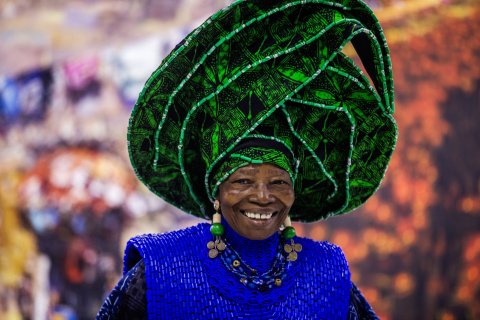Akintunde Akinleye
✓ Link copied to clipboard!
In her namesake gallery in Lagos, Nike Davies-Okundaye shows off a painting adorned with the colors of both the Nigerian and American flags. It’s a stylized portrait of U.S. Secretary of State Antony Blinken, who visited the gallery earlier this year.
Upstairs, an oil paint and canvas hewn image of Nigerian folk hero Fela Kuti peers out at potential customers. Davies-Okundaye’s own large beadwork piece, depicting dozens of the mothers who demonstrated in Abuja a decade ago after insurgents kidnapped their daughters, is among some 5,000 works of art for sale in her space in the Ikoyi neighborhood.
Davies-Okundaye is a living testament to the cultural transformation that has brought new attention and appreciation to Nigeria’s artists.
The artist and entrepreneur, 73, owns galleries across Africa’s most populous country and has driven much of Nigeria’s contemporary art evolution over the last generation. The country’s artwork, formerly considered a luxury reserved for expats, has become what Davies-Okundaye calls a vehicle for social, economic and political change.

Akintunde Akinleye
At her gallery—four floors filled with sculpture, mixed media, portraits and masks that testify to Nigeria’s cultural wealth—she nods to her beadwork piece commemorating the protests that sparked the “Bring Back Our Girls” campaign. “They managed to bring some of them back, but not all of them yet,” Davies-Okundaye told Newsweek recently.
“So that is political. Many people, they will say, ‘Don’t show this work.’ I said, ‘Yes, we have to remind them that not all the girls are back.'”
A fifth-generation artist, Davies-Okundaye was born into poverty in a small village about 300 miles northeast of Lagos. Her great-grandmother raised her after both her mother and grandmother died before she was 8 years old. Davies-Okundaye could not attend secondary school because her family lacked the funds, so she followed her great-grandmother into the family artistry business.
In 1967 she opened African Shop No. 1, selling art, crafts and trinkets to mostly expatriates. But Davies-Okundaye believed that art could transform not only her livelihood, but the lives of other artists—particularly rural women.
Many people, they will say, ‘Don’t show this work.’ I said ‘Yes, we have to remind them that not all the girls are back.’
“In those days, if your parents were not artists, you cannot be an artist…But now, we have made it open to everybody,” she said. “Because it’s a job. When you are looking for a job, you do your art and you get your money.”
Davies-Okundaye now boasts five galleries across the country—and, instead of expats, the Nigerian diaspora composes much of her clientele—and she travels the country and the world staging exhibitions and artist workshops.
She is especially proud of the gallery she opened in her village, Ogidi-Ijumu, where she trains rural women in artmaking techniques and sells their work in her gallery there and in Abuja, the country’s capital.”When you look at northern Nigeria, we needed art [galleries] there, especially for the women, who had the talent and the creativity but no place to sell it,” Davies-Okundaye said. “Their voice is their work.”
Her success mirrors the trajectory of some of her artist compatriots. Nigerian artists sold $5.5 million worth of work at auction in 2017, up from $3.7 million the year before, according to the Lagos-based Foundation for Contemporary and Modern Visual Arts’ most recent report on the state of the country’s art market. Works by the late painter and sculptor Ben Enwonwu can still garner over $1 million. And emerging artists, like the Instagram-famous London-based Olaolu Slawn, who designed last year’s BRIT awards, commanded five figures for his creations during his art auction debut at Sotheby’s in 2022.
Davies-Okundaye attributes part of the boom to the purchasing power of Nigerians abroad who want to connect to their heritage. They also want to promote the country’s cultural cache and to support the inclusion of women in the art world.
“Now, in my own lifetime, education has changed everything,” Davies-Okundaye said.
“You have to remain competent in what you are doing, and you have to be focused,” she tells emerging artists. “Whatever you want, you will get there, you just have to follow your heart.”
About the writer
Jennifer Cunningham
AND Matthew Tostevin
To read how Newsweek uses AI as a newsroom tool, Click here.
Source link : https://www.newsweek.com/2024/07/26/nigeria-art-mama-nike-davies-okundaye-africa-1925232.html
Author :
Publish date : 2024-07-17 09:00:01
Copyright for syndicated content belongs to the linked Source.





